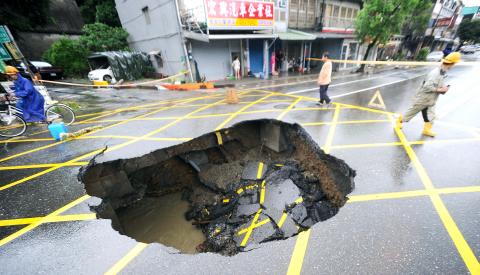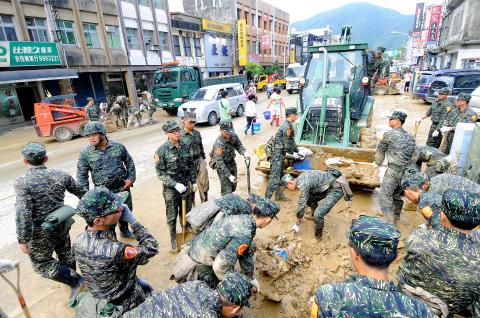Twelve people were confirmed dead and 26 remained missing yesterday as Typhoon Megi moved toward China after causing serious damage in northeastern Taiwan, especially in Yilan County.
While land warnings have been lifted for Taiwan proper and the Penghu archipelago, the Central Weather Bureau said Megi, downgraded to a tropical storm yesterday following its landfall in China’s Fujian Province, remained a threat to the outlying island of Kinmen.
As of 10:15pm yesterday, Megi was centered 80km west-northwest of Kinmen, packing maximum sustained winds of 83kph and gusts of 108kph. It was moving north at 11kph, the bureau said.

PHOTO: SAM YEH, AFP
In light of the rough sea conditions caused by the storm, ferry services between Kinmen and the Chinese cities of Xiamen and Quanzhou remained suspended.
Flights between Kinmen and Taiwan also remained suspended.
At press time, rescue teams were still searching for 26 missing people. Among the missing was a 21-member tour group that included 19 Chinese tourists from Guangdong Province, their Taiwanese tour guide Tseng Ching-hua (曾慶華) and Taiwanese driver Kuo Ming-lin (郭銘麟). The bus was likely traveling on the Suhua Highway when heavy rain and rockslides caused a section of the highway to collapse.

PHOTO: FANG PIN-CHAO, TAIPEI TIMES
Another Taiwanese driver and Chinese tour group leader in another bus belonging to Hong Tai Tour Agency (弘泰旅行社) were also missing. Fragments of the tour bus were found buried beneath debris, but there were no signs of the driver and tour guide, raising hopes that they managed to roll out of the vehicle as it tumbled into the valley. The tourists in the group managed to get off the bus in time.
The three other missing Taiwanese were a car driver and a couple driving a small truck. Rescuers found the small truck at about 7pm yesterday, but the couple’s whereabouts remained unknown.
With the rain brought by Megi subsiding, visibility has improved, enabling the SWAT team to dispatch six helicopters yesterday morning to airlift the remaining 54 people stranded on a section of the Suhua Highway damaged by rockslides on Thursday night.
Of the more than 400 people who were stranded, 274 were Chinese tourists.
Responding to criticism that the government was putting the safety of the Chinese tourists ahead of Taiwanese or other foreign tourists, the Tourism Bureau said the accusation was unfounded.
An official denied giving Chinese tourists preferential treatment, saying that the bureau only included Chinese tourists on its tally of people rescued “because they are the only tourists that are required to report their exact whereabouts while in Taiwan.”
Taiwanese travelers and tourists from countries other than China are not required to report their itineraries to the bureau, the official said, adding that there was therefore no way of knowing how many non-Chinese were involved in the incident.
As of 5pm yesterday, 12 people in Yilan County had been confirmed dead by the Central Emergency Operation Center, including nine buried by a mudslide that inundated the Bai Yun Temple (白雲寺) in the coastal town of Suao (蘇澳).
Megi wrought havoc across the country by dumping more than 1,200mm of rain, mostly in the northeastern parts of Taiwan in over 48 hours.
The Council of Agriculture (COA) said that agricultural losses had reached NT$55.71 million (US$1.8 million) as of yesterday.
Most of the damage was to farmland, which sustained NT$26.97 million in losses, with more than 400 hectares of crops in Taipei, Yilan, Hualien and Taitung counties suffering at least 44 percent destruction because of the heavy rain brought by Megi since Oct. 17.
Livestock losses totaled NT$8.59 million, while the fishery sector faced NT$12.21 million in losses.
The council said fish farms raising white prawn, tilapia and groupers were the hardest-hit.
Usable farmland losses were estimated at NT$7.83 million, with another NT$110,000 in poultry facilities destroyed.
In other developments, the organizers of the Taipei International Flora Expo reopened the Dajia Riverside Park area for trial operations yesterday after the site was closed for two days because of the typhoon.
Chen Hsiung-wen (陳雄文), executive director of the expo’s organizing committee, said about 20 percent of the flowers and plants in the area were destroyed by the typhoon, adding that the contractor would replace the damaged plants by tomorrow.
He said that based on their contract, the contractor will be responsible for the cost of flower rearrangement, dismissing concerns about the need for a budget increase in the wake of the typhoon.
The expo’s trial operation is currently on its third phase, with organizers opening the Yuanshan Park and the Dajia Park areas for all to visit.
The Xinsheng Park area, which was only opened in the second phase of the trial run, will also be reopened along with the other two areas on Monday when the expo enters its final stage of trial operations.
ADDITIONAL REPORTING BY LOA IOK-SIN AND MO YAN-CHIH

A magnitude 7.0 earthquake struck off Yilan at 11:05pm yesterday, the Central Weather Administration (CWA) said. The epicenter was located at sea, about 32.3km east of Yilan County Hall, at a depth of 72.8km, CWA data showed There were no immediate reports of damage. The intensity of the quake, which gauges the actual effect of a seismic event, measured 4 in Yilan County area on Taiwan’s seven-tier intensity scale, the data showed. It measured 4 in other parts of eastern, northern and central Taiwan as well as Tainan, and 3 in Kaohsiung and Pingtung County, and 2 in Lienchiang and Penghu counties and 1

A car bomb killed a senior Russian general in southern Moscow yesterday morning, the latest high-profile army figure to be blown up in a blast that came just hours after Russian and Ukrainian delegates held separate talks in Miami on a plan to end the war. Kyiv has not commented on the incident, but Russian investigators said they were probing whether the blast was “linked” to “Ukrainian special forces.” The attack was similar to other assassinations of generals and pro-war figures that have either been claimed, or are widely believed to have been orchestrated, by Ukraine. Russian Lieutenant General Fanil Sarvarov, 56, head

FOREIGN INTERFERENCE: Beijing would likely intensify public opinion warfare in next year’s local elections to prevent Lai from getting re-elected, the ‘Yomiuri Shimbun’ said Internal documents from a Chinese artificial intelligence (AI) company indicated that China has been using the technology to intervene in foreign elections, including propaganda targeting Taiwan’s local elections next year and presidential elections in 2028, a Japanese newspaper reported yesterday. The Institute of National Security of Vanderbilt University obtained nearly 400 pages of documents from GoLaxy, a company with ties to the Chinese government, and found evidence that it had apparently deployed sophisticated, AI-driven propaganda campaigns in Hong Kong and Taiwan to shape public opinion, the Yomiuri Shimbun reported. GoLaxy provides insights, situation analysis and public opinion-shaping technology by conducting network surveillance

‘POLITICAL GAME’: DPP lawmakers said the motion would not meet the legislative threshold needed, and accused the KMT and the TPP of trivializing the Constitution The Legislative Yuan yesterday approved a motion to initiate impeachment proceedings against President William Lai (賴清德), saying he had undermined Taiwan’s constitutional order and democracy. The motion was approved 61-50 by lawmakers from the main opposition Chinese Nationalist Party (KMT) and the smaller Taiwan People’s Party (TPP), who together hold a legislative majority. Under the motion, a roll call vote for impeachment would be held on May 19 next year, after various hearings are held and Lai is given the chance to defend himself. The move came after Lai on Monday last week did not promulgate an amendment passed by the legislature that